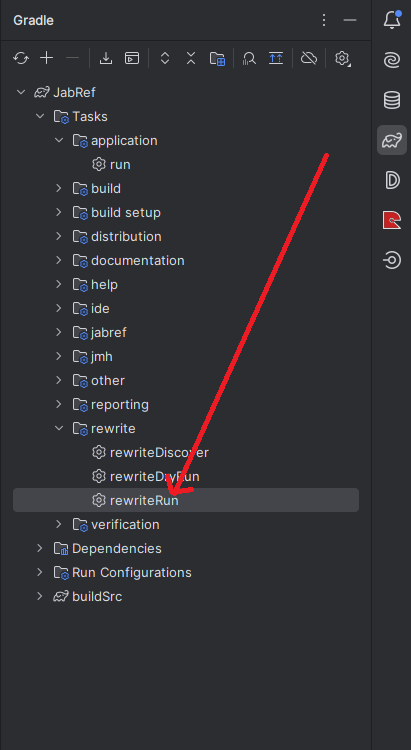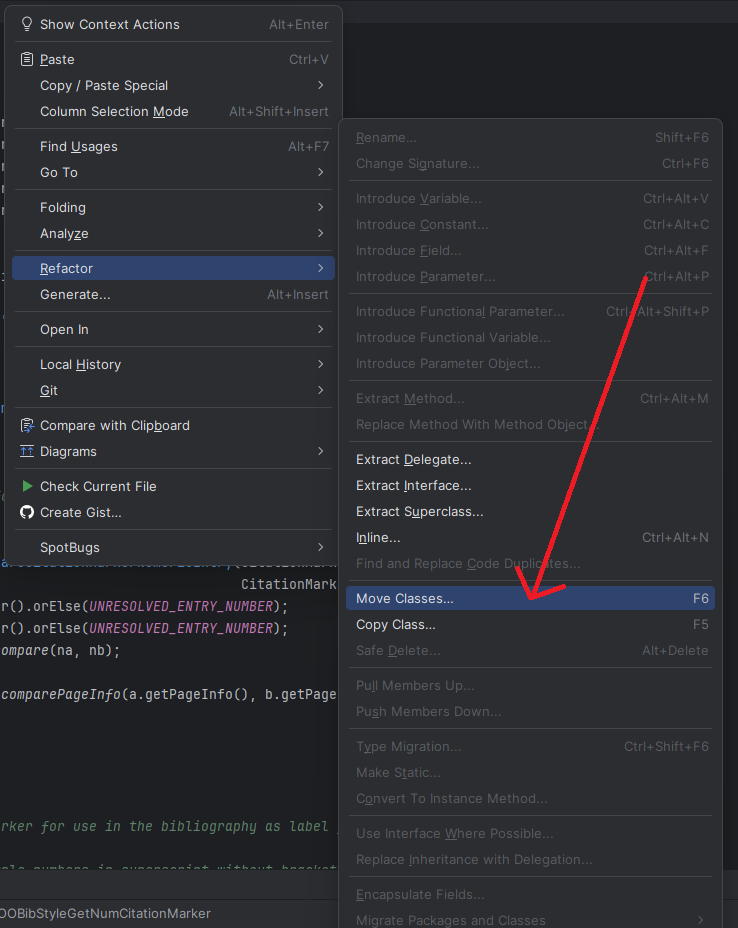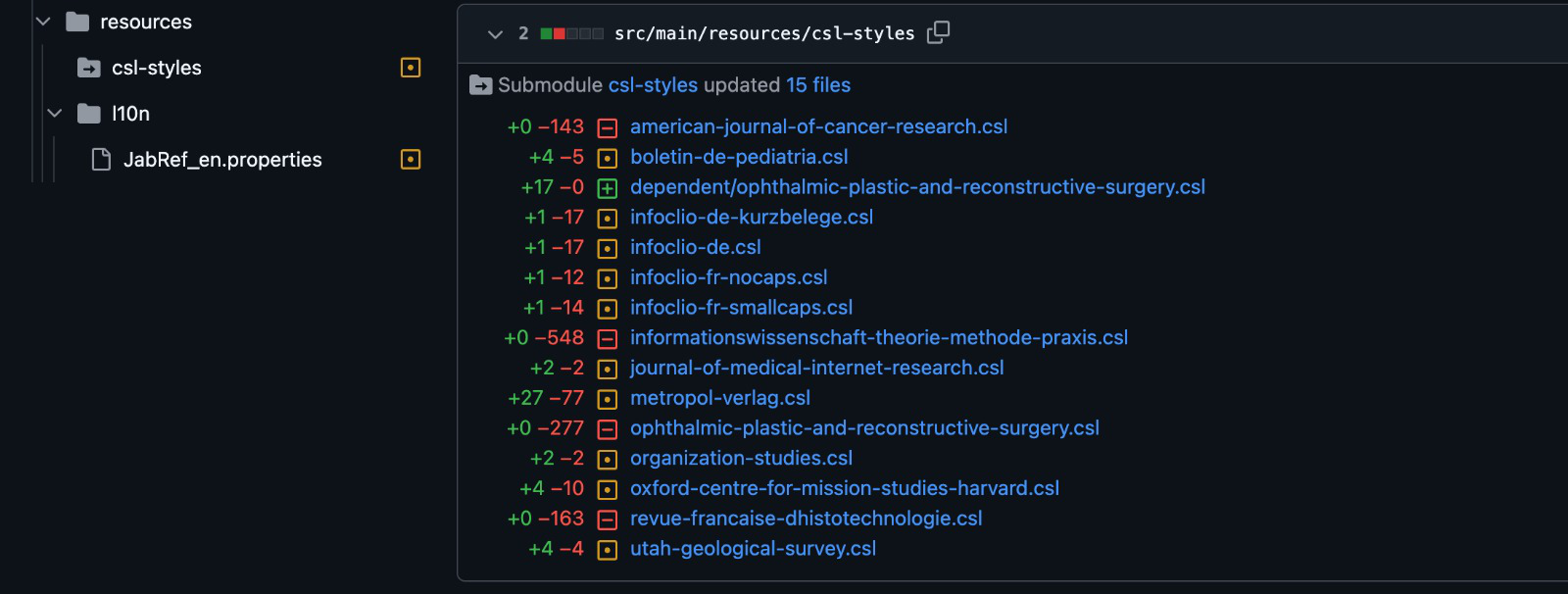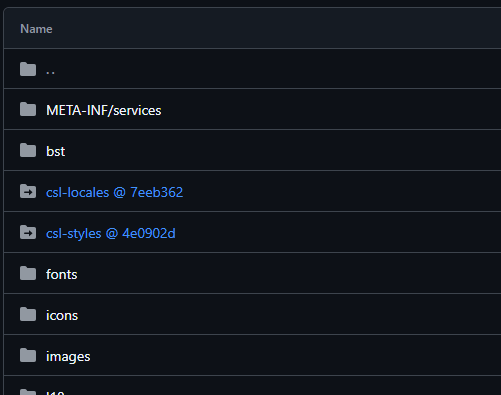Frequently Asked Questions (FAQ)
Following is a list of common errors encountered by developers which lead to failing tests, with their common solutions:
git hints
- Sync your fork with the JabRef repository: General howto by GitHub
- Branches and pull requests (🇩🇪): https://github.com/unibas-marcelluethi/software-engineering/blob/master/docs/week2/exercises/practical-exercises.md
- https://github.com/blog/2019-how-to-undo-almost-anything-with-git
- So you need to change your commit
- Awesome hints and tools regarding git: https://github.com/dictcp/awesome-git
Failing GitHub workflow “Sync fork with upstream”
To ease development, a GitHub workflow automatically updates your main branch daily. However, it is not allowed to update your files if the GitHub workflows are updated by the JabRef team. Therefore, GitHub notifies you now and then that “Sync fork with upstream failed for main branch”.
To solve this issue, open your GitHub repository in your browser. Then, click “Sync fork” to get your fork up-to-date and get the workflow passing again.
Failing tests
Failing Checkstyle tests
JabRef follows a pre-defined style of code for uniformity and maintainability that must be adhered to during development. To set up warnings and auto-fixes conforming to these style rules in your IDE, follow Step 3 of the process to set up a local workspace in the documentation. Ideally, follow all the set up rules in the documentation end-to-end to avoid typical set-up errors.
Note: The steps provided in the documentation are for IntelliJ, which is the preferred IDE for Java development. The checkstyle.xml is also available for VSCode, in the same directory as mentioned in the steps.
Failing OpenRewrite tests
Execute the Gradle task rewriteRun from the rewrite group of the Gradle Tool window in IntelliJ to apply the automated refactoring and pass the test:

Background: OpenRewrite is an automated refactoring ecosystem for source code.
org.jabref.logic.l10n.LocalizationConsistencyTest findMissingLocalizationKeys FAILED
You have probably used Strings that are visible on the UI (to the user) but not wrapped them using Localization.lang(...) and added them to the localization properties file.
Read more about the background and format of localization in JabRef.
org.jabref.logic.l10n.LocalizationConsistencyTest findObsoleteLocalizationKeys FAILED
Navigate to the unused key-value pairs in the file and remove them. You can always click on the details of the failing test to pinpoint which keys are unused.
Background: There are localization keys in the localization properties file that are not used in the code, probably due to the removal of existing code. Read more about the background and format of localization in JabRef.
org.jabref.logic.citationstyle.CitationStyleCatalogGenerator generateCitationStyleCatalog ERROR: Could not find any citation style. Tried with /ieee.csl.
Check the directory jablib/src/main/resources/csl-styles. If it is missing or empty, run git submodule update. Now, check inside if ieee.csl exists. If it does not, run git reset --hard inside that directory.
java.lang.IllegalArgumentException: Unable to load locale en-US ERROR: Could not generate BibEntry citation. The CSL engine could not create a preview for your item.
Check the directory jablib/src/main/resources/csl-locales. If it is missing or empty, run git submodule update. If still not fixed, run git reset --hard inside that directory.
org.jabref.support.CommonArchitectureTest restrictStandardStreams FAILED
Check if you’ve used System.out.println(...) (the standard output stream) to log anything into the console. This is an architectural violation, as you should use the Logger instead for logging. More details on how to log.
org.jabref.support.CommonArchitectureTest doNotUseLogicInModel FAILED
One common case when this test fails is when you put any class purely containing business logic inside the model package (i.e., inside the directory org/jabref/model/). To fix this, shift the class to a sub-package within the logic package (i.e., the directoryorg/jabref/logic/). An efficient way to do this is to use IntelliJ’s built-in refactoring capabilities - right-click on the file, go to “Refactor” and use “Move Class”. The import statement for all the classes using this class will be automatically adjusted according to the new location.

More information on the architecture can be found at ../getting-into-the-code/high-level-documentation.md.
Check external href links in the documentation / check-links (push) FAILED
This test is triggered when any kind of documentation is touched (be it the JabRef docs, or JavaDoc in code). If you changed something in the documentation, and particularly added/changed any links (to external files or websites), check if the links are correct and working. If you didn’t change/add any link, or added correct links, the test is most probably failing due to any of the existing links being broken, and thus can be ignored (in the context of your contribution).
Failing Fetcher tests
Fetcher tests are run when any file in the .../fetcher directory has been touched. If you have changed any fetcher logic, check if the changes are correct. You can look for more details on how to locally run fetcher tests. Otherwise, since these tests depend on remote services, their failure can also be caused by the network or an external server, and thus can be ignored in the context of your contribution. For more information, you can look at commiting and pushing changes to fetcher tests.
Gradle outputs
ANTLR Tool version 4.12.0 used for code generation does not match the current runtime version 4.13.1
Execute the Gradle task clean from the build group of the Gradle Tool Window in IntelliJ:

BstVMVisitor.java:157: error: package BstParser does not exist
Execute gradle task clean from the build group of the Gradle Tool Window in IntelliJ.
No test candidates found
You probably chose the wrong gradle task:

Submodules
The problem
Sometimes, when contributing to JabRef, you may see abbrv.jabref.org, csl-styles or csl-locales among the changed files in your pull request. This means that you have accidentally committed your local submodules into the branch.

Context
JabRef needs external submodules (such as CSL style files) for some of its respective features. These are cloned once when you set up a local development environment, using --recurse-submodules (you may have noticed). These submodules, in the main branch, are automatically periodically updated but not fetched into local again when you pull, as they are set to be ignored in .gitmodules (this is to avoid merge conflicts). So when remote has updated submodules, and your local has the old ones, when you stage all files, these changes are noticed.
What’s strange (mostly an IntelliJ bug): Regardless of CLI or GUI, These changes should ideally not be noticed on staging, as per the .gitmodules configuration. However, that is somehow overruled when using IntelliJ’s CLI.
Fix
For csl-styles, csl-locales, and abbrev.jabref.org:
git merge origin/main
git checkout main -- jablib/src/main/resources/csl-styles
git checkout main -- jablib/src/main/resources/csl-locales
git checkout main -- jablib/src/main/abbrv.jabref.org
git commit -m "Fix submodules"
git push
Alternative method (if the above doesn’t work)
-
Edit
.gitmodules: comment outignore = all(for the respective submodules you are trying to reset)# ignore = all -
cdinto the changed submodules directory (lets saycsl-styleswas changed):cd jablib/src/main/resources/csl-styles -
Find the latest submodule commit id from remote (github):

Here, in the case of
csl-styles, it is4e0902d. -
Checkout the commit:
git checkout 4e0902d -
Now, IntelliJ’s commit tab will notice that the submodules have been modified. This means we are on the right track.
-
Use IntelliJ’s git manager (commit tab) or
git guito commit submodule changes only. Repeat steps 2-5 for other submodules that are shown as modified in the PR. Then, push these changes. -
Revert the changes in
.gitmodules(that you made in step 1).
Prevention
To avoid this, avoid staging using any of these commands:
git add .git add jablib/src/main(or any path prefix)git commit -a
Preferably use a GUI-based git manager, such as the one built in IntelliJ or open git gui from the command line. Even if you accidentally stage them, don’t commit all files, selectively commit the files you touched using the GUI based tool, and push.
Q: I get java: package org.jabref.logic.journals does not exist
A: You have to ignore buildSrc/src/main as source directory in IntelliJ as indicated in our setup guide.
Also filed as IntelliJ issue IDEA-240250.
IDE import issues
One might see following error:
Could not apply requested plugin [id: 'org.jabref.gradle.module'] as it does not provide a plugin with id 'org.jabref.gradle.module'. This is caused by an incorrect plugin implementation. Please contact the plugin author(s).
> Plugin with id 'org.jabref.gradle.module' not found.
This happened on Debian 12, with IntelliJ IDEA 2025.2.4 (Ultimate Edition). The workaround is to compile JabRef once from the command line.
- Linux: Execute
./gradlew :jabgui:compileJava - Windows (Powershell): Execute
.\gradlew :jabgui:compileJava
In case Gradle does not find a JDK, use gg.cmd as follows:
- Download https://github.com/eirikb/gg/releases/latest/download/gg.cmd
- Move the file to your JabRef project directory
-
Compile JabRef
- Windows:
.\gg.cmd gradle:java@24 jabgui:compileJava - Linux:
sh -x ./gg.cmd gradle:java@24 jabgui:compileJava
- Windows:
- Wait until the command execution completes.
After about one minute, however, you can continue setting up IntelliJ, because the initial Gradle setup succeeded.
Gradle
Run gradle from command line
Sometimes, one needs to double-check that there is an IDE setup issue - and not an issue with modified Gradle builds files. It is easily possible to run Gradle from the command line without installing a separate JDK manually.